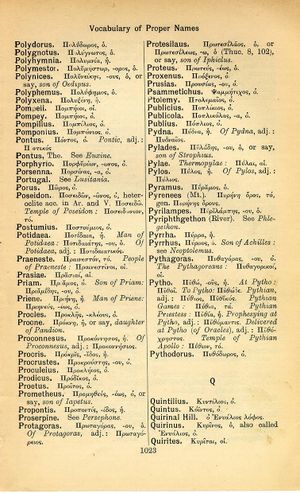Praeneste: Difference between revisions
ὑπὸ δὲ τῆς φιλαυτίας παρηγμένοι ἄλογα φασὶν τὰ ζῷα ἐφεξῆς τὰ ἄλλα σύμπαντα → it is self-love which leads them to say that all the other animals without exception are non-rational
m (Text replacement - "link={{" to "link={{") |
m (Text replacement - "}}]]" to "}}]]") |
||
| Line 1: | Line 1: | ||
{{WoodhouseENELnames | {{WoodhouseENELnames | ||
|Text=[[File:woodhouse_1023.jpg|thumb | |Text=[[File:woodhouse_1023.jpg|thumb | ||
|link={{filepath:woodhouse_1023.jpg | |link={{filepath:woodhouse_1023.jpg}}]]Πραινεστόν, τό. | ||
<b class="b2">People of Praeneste</b>: Πραινεστῖνοι, οἱ. | <b class="b2">People of Praeneste</b>: Πραινεστῖνοι, οἱ. | ||
Revision as of 10:11, 15 August 2017
English > Greek (Woodhouse)
Πραινεστόν, τό.
People of Praeneste: Πραινεστῖνοι, οἱ.
Latin > English (Lewis & Short)
Praeneste: is, n. and f., = Πραίνεστος or Πραίνεστε,
I one of the most ancient and important cities of Latium, famed for the beauty of its roses, for its nuts, and still more for its temple of Fortune and the oracle connected with it, now Palestrina; abl., Praeneste, Cic. Planc. 26; Hor. Ep. 1, 2, 2: Praeneste sub ipsā (sc. urbe), Verg. A. 8, 561: altum Praeneste, id. ib. 7, 682: frigidum, Hor. C. 3, 4, 22: sacrum, Stat. S. 4, 4, 15.—Hence,
II Praenestīnus, a, um, adj., of or belonging to Prœneste, Prœnestine: nuces, Cato, R. R. 8: urbs, the town of Prœneste, Verg. A. 7, 678: Praenestinae moenia sacra Deae, i. e. Fortunae, Ov. F. 6, 62: sortes, the oracles of Prœneste, Cic. Div. 2, 41, 86: ager, id. Agr. 2, 28: rosae, Plin. 21, 4, 10, § 16: via, from Rome to Prœneste, id. 31, 3, 25, § 42.—Subst.: Prae-nestīni, ōrum, m., the inhabitants of Prœneste, the Prœnestines, Plaut. Truc. 3, 2, 23; id. Trin. 3, 1, 8 Brix ad loc.; Liv. 6, 21 sq.; v. Ritschl, Opusc. 2, 372.
Latin > French (Gaffiot 2016)
Prænestĕ,¹² is, n. (f., Virg. En. 8, 561 ), Préneste, ville du Latium : Cic. Cat. 1, 8 ; Virg. En. 7, 682 ; Hor. O. 3, 4, 22 || -īnus, a, um, de Préneste : Cic. Agr. 2, 78 || subst. m. pl., habitants de Préneste : Liv. 6, 21.
Latin > German (Georges)
Praeneste, is, n., Stadt in Latium, wahrscheinlich Kolonie aus Sullas Zeit (s. Cic. Cat. 1, 8. Gell. 16, 13, 5), berühmt durch die Schönheit der dortigen Rosen u. Nüsse, bes. aber durch den Tempel der Fortuna u. das damit verbundene Orakel, j. Palestrina, Varro LL. 5, 32 u. 6, 4 (wo Abl. e). Cic. Cat. 1, 8; Planc. 63 (wo Abl. e). Prop. 2, 32, 3 (wo Abl. i): wegen seiner hohen Lage altum Pr., Verg. Aen. 7, 682, u. frigidum, Hor. carm. 3, 4, 23. – fem. b. Dicht., wie Verg. Aen. 8, 561. – Dav. Praenestīnus, a, um, pränestinisch, aus Präneste, ager, Liv.: nuces, Cato: rosae, Plin.: urbs, Stadt Präneste, Verg.: sortes, die pränestinischen Orakelsprüche, Cic. u. Suet. – subst., ein Pränestiner, Praenestinum opino (= opinor) esse, ita erat gloriosus, Plaut. fr. bei Non. 474, 32: Plur., Praenestīnī, ōrum, m., die Einw. von Präneste, die Pränestiner, Cic. u.a.

